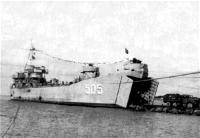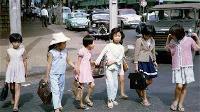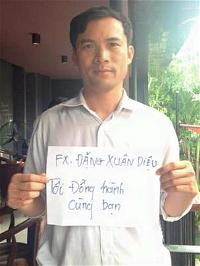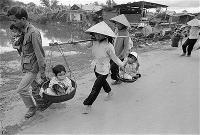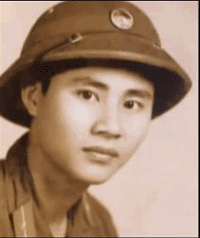Paris – Like many of his countrymen, Duyen Anh, a Vietnamese poet and novelist, has misleadingly youthful looks. His smooth, cherubic features show no sign of the hunger and pain of six years of “re-education through labor” the ordeal of an escape by boat and six frustrating months in Malaysian reception camps, before a reunion in France with his wife and family.
Sentenced by Vietnamese authorities in 1976 without trial as one of “the 10 most dangerous writers” in Vietnam, he was released in 1981 thanks to the efforts of PEN and Amnesty International. “Clemency” was the official explanation for the release of a man who steadfastly insisted that he “may have betrayed the revolution but never his people” – a phrase that stuck in the throats of the would-be mind controllers.
This smiling, courteous man, who received me at his home in the Paris suburb of Le Plessis-Robinson, is one of his country’s most popular and prolific writers. Four novels were made into films. He also composes romantic songs.
Today, at 53, in exile, Duyen Anh describes in fiction and memoir the martyrdom of the people of South Vietnam since the helicopters lifted off from the roof of the American Embassy in Saigon in April 1975.
Two books in Vietnamese about the Indochinese gulag have been published in the United States. They await translation. His second nove to appear in French translation, “La Colline de Fanta” (Fanta Hill) was recently published by Pierre Belfond. It is the story of the street in Saigon by a North Vietnamese army patrol after April 1975.
First herded into a stadium with a group of street urchins, then jailed at the notorious Chi Hoa prison and finally sent to a re-education camp, the boy, Nguyen Huu Vu, is a witness to the murderous cruelty inflicted on the hapless ragamuffins by the can bo, or cadres, whose task is to “impregnate them with the wisdom of our great masters Marx and Lenin”. The many children – some are only 6 – who succumb to the brutality of their “teachers” or die of malaria, dysentery or snake-bite, are buried by their little comrades on a neighboring hill. Their tombstones are empty Fanta bottles stuck upside down by their graves, containing notes of their names and dates of death.
 Duyen Anh writes with realism and dark poetry of his own experience, directly in his memoirs and fictionally distilled in his novels. In one poem, he describes how a fellow prisoner’s legs shattered in a bomd-disposal accident, are sawn off without anaesthetic. There is also an amazing strain of sympathy for his ignorant tormentors.
Duyen Anh writes with realism and dark poetry of his own experience, directly in his memoirs and fictionally distilled in his novels. In one poem, he describes how a fellow prisoner’s legs shattered in a bomd-disposal accident, are sawn off without anaesthetic. There is also an amazing strain of sympathy for his ignorant tormentors.
In the camps, where he was often assigned the most degrading duties – like cleaning cesspools with his hands – Duyen Anh compares himself with the water spider, which spends its life struggling against the current. He expressed this resignation, which is also a tenacious will to survive, in poems composed mentally in prison, some of which he remembered well enough to write down after his release. They have been privatelly printed in French.
In an introduction, Duyen Anh describes how hw survived the prisons of Chi Hoa and Gia Dinh, where he spent the first three years of his detention.
“I had no need of pen and paper (which were borbidden), only inspiration” he wrote. He got this from the itch that tormented the prisoner’s bodies in the crammed unhygienic cells.
“I simply scratched myself and thought up verses” he continued “In suffering and solitude I thirsted more for poems than to see my wife’s tears, my children’s smiles, for a glimpse of life beyond the heavy prison door, for a bowl of white rice, a cup of tea or an eight-minute collective bath. But I did not complain. I left light, as in a dream. I brought life with me into prison and the prison into my life”. His philosophy is simple and passionately held. “Suffering was then the food of my creative life. This is why I composed verses, just to exist”
Today, he says “I feel no hatred for anyone. But I detest all doctrines with the blind ambitions which always go with them. They persecute and abuse human beings. Man is eternal, whether capitalist or communist. The ideal and duty of a poet is to waken those who have lost their human conscience, andto discourage them from killing each other. Poetry is not the voice of hatred.”
However, the hatred he rejects has pursued Duyen Anh into a freedom that has not brought an end to suffering. In May last year, during a visit to the United States, he was savagely set upon by unidentified Vietnamese in Westminster, a suburb of Los Angeles. Karate blows put him into a long deep coma. Today, partially recovered after long hospital treatment in France, his speech is slightly slurred and his right arm paralyzed. Te attempted murder has remained a mystery. The writer has brought no charges. “I don’t know who was behind it, whether Communist or
Duyen Anh (meaning “my love”) is a pen name that evokes the romantic view of life that inspired him to write novels that were widely read before the “reality” of the Commnist victory. Born Vu Mong Long in 1935 to a poor family at Thai Binh in North Vietnam, he joined the southward migration permitted under the Geneva agreement in September 1954. But he soon played a role in one of the ineffective “liberal” movements challenging the authoritarian regime of Ngo Dinh Diem.
Today, Duyen Anh thinks he was “young and naive” to have opposed Diem, who he describes as “a patriot and honest man” who was respected even by the Communists, but descredited by nepotism, chiefly by his sister-in-law, Madame Nhu, and her husband, Ngo Dinh Nhu, “an ideologue and like all creators of doctrines, more or less a dictator”.
Duyen Anh is a bitter about the United States in two ways: politically, for its support of corrupt military dictators after Diem, and personally, for leaving him and other writers in the lurch after promising them safe passage out of the country. His dismay is expressed in a pamplet, “Saigon, the Longest Day”, published in Vietnamese in the United States last year.
But he believes that his own countrymen are chiefly to blame for Vietnam’s plight, throught their failure to overcome divisive hatred. Western-trained experts in the South could have helped the North catch up on its Soviet-engendered backwardness. Instead, Hanoi gave priority to extirpating all memory of the hated “imperialists”. Southern industries were destroyed and technicians brutalized until those who could took to the boats.
Michael Field, former Paris bureau chief of the Daily Telegraph, covered Indochina from
Source: International Herald Tribune, Vol 33,001; 13/89
Sentenced by Vietnamese authorities in 1976 without trial as one of “the 10 most dangerous writers” in Vietnam, he was released in 1981 thanks to the efforts of PEN and Amnesty International. “Clemency” was the official explanation for the release of a man who steadfastly insisted that he “may have betrayed the revolution but never his people” – a phrase that stuck in the throats of the would-be mind controllers.
This smiling, courteous man, who received me at his home in the Paris suburb of Le Plessis-Robinson, is one of his country’s most popular and prolific writers. Four novels were made into films. He also composes romantic songs.
Today, at 53, in exile, Duyen Anh describes in fiction and memoir the martyrdom of the people of South Vietnam since the helicopters lifted off from the roof of the American Embassy in Saigon in April 1975.
Two books in Vietnamese about the Indochinese gulag have been published in the United States. They await translation. His second nove to appear in French translation, “La Colline de Fanta” (Fanta Hill) was recently published by Pierre Belfond. It is the story of the street in Saigon by a North Vietnamese army patrol after April 1975.
First herded into a stadium with a group of street urchins, then jailed at the notorious Chi Hoa prison and finally sent to a re-education camp, the boy, Nguyen Huu Vu, is a witness to the murderous cruelty inflicted on the hapless ragamuffins by the can bo, or cadres, whose task is to “impregnate them with the wisdom of our great masters Marx and Lenin”. The many children – some are only 6 – who succumb to the brutality of their “teachers” or die of malaria, dysentery or snake-bite, are buried by their little comrades on a neighboring hill. Their tombstones are empty Fanta bottles stuck upside down by their graves, containing notes of their names and dates of death.
 Duyen Anh writes with realism and dark poetry of his own experience, directly in his memoirs and fictionally distilled in his novels. In one poem, he describes how a fellow prisoner’s legs shattered in a bomd-disposal accident, are sawn off without anaesthetic. There is also an amazing strain of sympathy for his ignorant tormentors.
Duyen Anh writes with realism and dark poetry of his own experience, directly in his memoirs and fictionally distilled in his novels. In one poem, he describes how a fellow prisoner’s legs shattered in a bomd-disposal accident, are sawn off without anaesthetic. There is also an amazing strain of sympathy for his ignorant tormentors.In the camps, where he was often assigned the most degrading duties – like cleaning cesspools with his hands – Duyen Anh compares himself with the water spider, which spends its life struggling against the current. He expressed this resignation, which is also a tenacious will to survive, in poems composed mentally in prison, some of which he remembered well enough to write down after his release. They have been privatelly printed in French.
In an introduction, Duyen Anh describes how hw survived the prisons of Chi Hoa and Gia Dinh, where he spent the first three years of his detention.
“I had no need of pen and paper (which were borbidden), only inspiration” he wrote. He got this from the itch that tormented the prisoner’s bodies in the crammed unhygienic cells.
“I simply scratched myself and thought up verses” he continued “In suffering and solitude I thirsted more for poems than to see my wife’s tears, my children’s smiles, for a glimpse of life beyond the heavy prison door, for a bowl of white rice, a cup of tea or an eight-minute collective bath. But I did not complain. I left light, as in a dream. I brought life with me into prison and the prison into my life”. His philosophy is simple and passionately held. “Suffering was then the food of my creative life. This is why I composed verses, just to exist”
Today, he says “I feel no hatred for anyone. But I detest all doctrines with the blind ambitions which always go with them. They persecute and abuse human beings. Man is eternal, whether capitalist or communist. The ideal and duty of a poet is to waken those who have lost their human conscience, andto discourage them from killing each other. Poetry is not the voice of hatred.”
However, the hatred he rejects has pursued Duyen Anh into a freedom that has not brought an end to suffering. In May last year, during a visit to the United States, he was savagely set upon by unidentified Vietnamese in Westminster, a suburb of Los Angeles. Karate blows put him into a long deep coma. Today, partially recovered after long hospital treatment in France, his speech is slightly slurred and his right arm paralyzed. Te attempted murder has remained a mystery. The writer has brought no charges. “I don’t know who was behind it, whether Communist or
Duyen Anh (meaning “my love”) is a pen name that evokes the romantic view of life that inspired him to write novels that were widely read before the “reality” of the Commnist victory. Born Vu Mong Long in 1935 to a poor family at Thai Binh in North Vietnam, he joined the southward migration permitted under the Geneva agreement in September 1954. But he soon played a role in one of the ineffective “liberal” movements challenging the authoritarian regime of Ngo Dinh Diem.
Today, Duyen Anh thinks he was “young and naive” to have opposed Diem, who he describes as “a patriot and honest man” who was respected even by the Communists, but descredited by nepotism, chiefly by his sister-in-law, Madame Nhu, and her husband, Ngo Dinh Nhu, “an ideologue and like all creators of doctrines, more or less a dictator”.
Duyen Anh is a bitter about the United States in two ways: politically, for its support of corrupt military dictators after Diem, and personally, for leaving him and other writers in the lurch after promising them safe passage out of the country. His dismay is expressed in a pamplet, “Saigon, the Longest Day”, published in Vietnamese in the United States last year.
But he believes that his own countrymen are chiefly to blame for Vietnam’s plight, throught their failure to overcome divisive hatred. Western-trained experts in the South could have helped the North catch up on its Soviet-engendered backwardness. Instead, Hanoi gave priority to extirpating all memory of the hated “imperialists”. Southern industries were destroyed and technicians brutalized until those who could took to the boats.
Michael Field, former Paris bureau chief of the Daily Telegraph, covered Indochina from
Source: International Herald Tribune, Vol 33,001; 13/89
Gửi ý kiến của bạn
